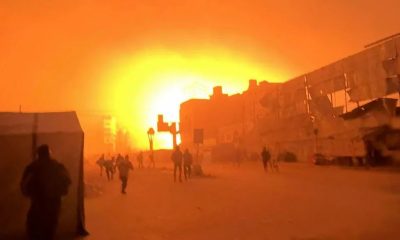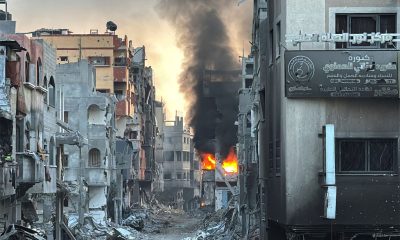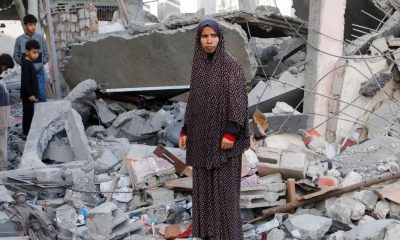International
More deaths as Israel unleashes massive bombs on Gaza

More deaths as Israel unleashes massive bombs on Gaza
Israel resumed its deadly bombardment of Gaza on Friday, saying it struck more than 200 targets in the densely inhabited Palestinian territory despite international calls for a renewed truce.
The Hamas-run health ministry said that at least 109 people had been killed in Gaza since the pause in hostilities expired in the morning and ground battles and Israel air strikes resumed.
Israel alleged that Hamas had attempted to break the truce even before it ended at 0500 GMT by firing a rocket and that it had failed to produce a list of hostages that could have been released on Friday in exchange for Palestinian prisoners.
But both the United Nations chief and the White House called for the break in fighting to be restored, and UN agencies warned of a “catastrophic” humanitarian situation as bombs fell and hospitals again struggled to cope with the wounded after a week-long respite.
“We continue to work with Israel, Egypt, and Qatar on efforts to extend the humanitarian pause in Gaza,” a White House National Security Council spokesperson said after US Secretary of State Antony Blinken left Israel following diplomatic efforts to shore up the truce.
In a social media post, United Nations Secretary-General Antonio Guterres said: “I deeply regret that military operations have started again in Gaza. I still hope that it will be possible to renew the pause that was established.”
Under the truce, Hamas militants released hostages in exchange for Palestinian prisoners held in Israeli jails, and greater aid flows into war-devastated Gaza.
But with explosions audible and a dark column of smoke rising over northern Gaza, Israel’s army said its warplanes were striking Hamas targets across the Palestinian territory and AFP journalists saw, and visited the aftermath, of several bombings.
READ ALSO:
- Fake US military officer jailed in Kaduna
- IPOB kicks as Enugu governor calls group ‘proscribed’
- Mohbad’s wife requested DNA tests from US hospital, 2 others — Iyabo Ojo
Outgoing missiles fired by Palestinian groups towards Israel were also seen.
“The healthcare service is on its knees,” Rob Holden, a World Health Organisation (WHO) senior emergency officer, told journalists in Geneva on a video link from Gaza as explosions were heard in the background. “It is like a horror movie.”
Israeli officials, however, took a tough line, insisting Hamas was to blame for the new eruption of fighting and vowing to destroy the Islamist movement.
“Unfortunately, Hamas decided to terminate the pause by failing to release all the kidnapped women,” Israeli government spokesman Eylon Levy told reporters. “Having chosen to hold onto our women, Hamas will now take the mother of all thumpings.”
The Israeli military said: “Over the last few hours, ground, air and naval forces struck terror targets in the north and south of the Gaza Strip, including in Khan Yunis and Rafah.”
Combat resumed shortly after Israel’s army said it had intercepted a rocket fired from Gaza, the first from the territory since a missile launched minutes into the truce on November 24.
In the rubble of a house destroyed by bombs in the southern Gaza city of Rafah, a man screamed: “Where are my children?”
In Khan Yunis, a group of men chanted “God is greatest” as they rushed through the streets carrying a body wrapped in a white shroud. War has returned, even more fiercely”, Anas Abu Dagga, 22, told AFP.
On a bed at Khan Yunis’s Nasser hospital, a member of the same family, Amal Abu Dagga wept, her beige veil covered in blood.
“I don’t even know what happened to my children,” she said. Another relative, Jamil Abu Dagga, told AFP the family had been at home when the bombs started falling.
In Israel, sirens warning of potential missiles sounded in several communities near Gaza, and authorities said they were restarting security measures in the area including closing schools.
A rocket strike destroyed a van in one Israeli community near Gaza.
The office of Israeli Prime Minister Benjamin Netanyahu said fighting had restarted after Hamas violated the truce.
“The Government of Israel is committed to achieving the goals of the war: Releasing the hostages, eliminating Hamas and ensuring that Gaza never again constitutes a threat to the residents of Israel,” it said.
READ ALSO:
- Gunmen abduct catholic priest, driver in Imo
- Kano governorship dispute : APC files cross-appeal at Supreme Court
- Police, ICPC clear D’banj of N-Power fraud, rape allegations
Despite the resumption of fighting, talks between Qatari and Egyptian mediators were “ongoing”, said a source briefed on the talks.
During the seven-day truce, Hamas freed 80 Israeli hostages in exchange for 240 Palestinian prisoners, and more aid entered Gaza, where 1.7 million people are displaced and short of food, water and other essentials, according to the United Nations.
Twenty-five other hostages, mostly Thais, were also freed during the truce but outside the scope of its terms.
On Thursday, Washington’s top diplomat Antony Blinken, meeting Israeli and Palestinian officials, called for the truce to be extended, and warned any resumption of combat must protect Palestinian civilians.
Other world leaders, and aid groups, had also sought an extended pause in the fighting that began on October 7 when Hamas militants broke through Gaza’s militarised border into Israel.
During the unprecedented attack, Hamas killed about 1,200 people, mostly civilians, and kidnapped around 240, according to Israeli authorities.
In response, Israel vowed to eliminate Hamas and unleashed an air and ground military campaign in Gaza that the Hamas authorities who run Gaza say has killed more than 15,000 people, also mostly civilians.
– ‘Evacuation zones’ –
On Thursday eight more Israeli hostages, some holding dual nationality, were released.
READ ALSO:
- Women are witches, manipulators – Ooni
- Ekiti pastor arrested for allegedly killing his pregnant wife for ritual
- Gunfire breaks out in Guinea-Bissau’s capital amid coup scare
- BREAKING : Gunmen attack residence of INEC REC
Not long after the hostages arrived in Israel, the country’s prison service said another 30 Palestinian prisoners — 23 minors and seven women — had been freed.
Hamas said it had also offered to hand over the bodies of a mother and her two sons — one of them a baby — in talks to extend the now-expired truce.
Shiri Bibas, her 10-month-old son Kfir and his four-year-old brother Ariel, along with their father Yarden, have become emblematic of the October 7 attacks due to the age of baby Kfir. Israeli officials refused to comment on Hamas’s “propaganda”.
The Israeli military published a map of “evacuation zones” in the Gaza Strip. The military said it would enable residents to “evacuate from specific places for their safety if required”.
Residents in multiple areas were sent SMS warnings on Friday.
Israeli forces “will begin a crushing military attack on your area of residence to eliminate the terrorist organisation Hamas,” the warnings said.
“Stay away from all military activity of every kind.”
More deaths as Israel unleashes massive bombs on Gaza
(AFP)
International
US, Iran hold ‘constructive’ first round of nuclear talks
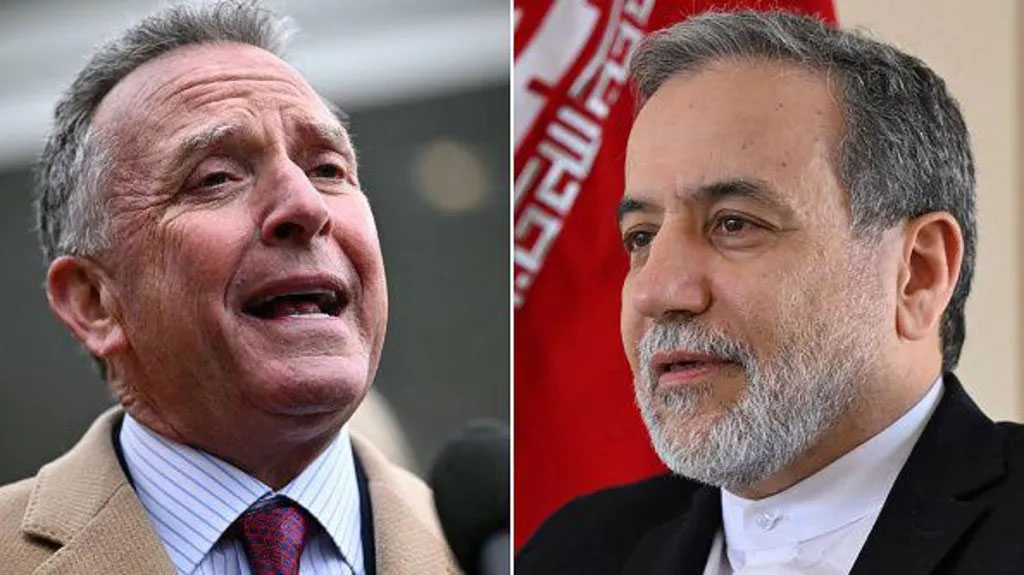
US, Iran hold ‘constructive’ first round of nuclear talks
Iran and the US have concluded a first round of talks in Oman over Tehran’s nuclear programme – the highest-level meeting between the two nations since 2018.
Both countries described the meeting as “constructive” and confirmed a second round of discussions will take place next week – with the US hailing the “direct communication” as being key to striking a possible deal.
President Donald Trump pulled the US out of a previous nuclear agreement between Iran and world powers in 2018, and has long said he would make a “better” deal.
The talks are seen as an important first step in establishing whether a deal can be done.
At two-and-a-half hours, the first meeting was brief, reportedly respectful – and set the stage for a second round.
That was probably as good as it could get when Iranian and US officials sat down in Muscat, the capital of Oman – whose top diplomat mediated the primarily indirect negotiations.
They were the most significant talks since Trump pulled the US out of the Iran nuclear deal of 2015 during his first term in office.
The verdict of Iran’s lead negotiator, Foreign Minister Abbas Araghchi, was positive.
“In my opinion, as the first meeting, it was a constructive meeting held in a very peaceful and respectful environment, because no inappropriate language was used,” he told Iranian state TV.
His diplomatic tone suggests the US team led by Trump’s envoy Steve Witkoff did not reiterate some of the president’s threats that Iran would face “great danger” if this dialogue did not succeed. He has repeatedly warned of possible military strikes.
READ ALSO:
- 2025 UTME: JAMB releases mock results
- Trump exempts smartphones, computers from new tariffs
- Gaza hospital hit by Israeli strike, Hamas-run health ministry says
This meeting ran with the delegations in separate rooms, relaying messages through Oman’s foreign minister, Badr bin Hamad al-Busaidi.
Witkoff, who is leading the US delegation, had previously only spoken of meeting face-to-face.
But Araghchi and Witkoff did speak for a few minutes in the presence of Busaidi – not the direct talks US officials said would happen but what could be a small but significant opening.
Iran, mindful of pressure from hardliners at home, underlined how limited their face-to-face exchange was, with no photographs taken.
In a statement following the talks, the White House said the discussions “were very positive and constructive”, noting that Witkoff had emphasised to Iran that he had instructions to resolve the adversaries’ “differences through dialogue and diplomacy, if that is possible”.
“These issues are very complicated, and special envoy Witkoff’s direct communication today was a step forward in achieving a mutually beneficial outcome,” the statement added.
Araghchi had said ahead of the discussions that his country wanted a “fair agreement”.
After the talks concluded, he said discussions next week may not happen in Oman, but would still be mediated by the Middle Eastern nation. The White House said they would take place next Saturday.
“Neither we, nor the other party, want fruitless negotiations, discussions for discussions’ sake, time wasting or talks that drag on forever,” Araghchi told Iranian state television.
The most important issue at stake is what kind of deal each side would be willing to accept.
Trump sent a letter to Iran’s supreme leader via the United Arab Emirates last month, saying he wanted a deal to prevent Iran from acquiring nuclear weapons and to avert possible military strikes by the US and Israel.
Iran hopes for a deal to limit, but not dismantle, its nuclear programme in exchange for sanctions relief.
An unnamed source in Oman told news agency Reuters that the talks would seek to de-escalate regional tensions and secure prisoner exchanges.
READ ALSO:
- Massilia Motors launches new Mitsubishi L200 with low fuel consumption, advanced engineering
- London mother sentenced to life in prison for drowning two sons
- LASRRA, LASDA to launch strategic documentation drive for Lagos diaspora database
Trump revealed the talks would take place during a visit by Benjamin Netanyahu to the White House on Monday. The Israeli prime minister said on Tuesday that both leaders had agreed that Iran “will not have nuclear weapons”.
Netanyahu has called for a “Libya-style deal”, referring to the north African nation completely dismantling its weapons programme in an agreement reached with Western powers in 2003. That would be completely unacceptable to Iran.
Iran insists its nuclear activities are entirely peaceful and that it will never seek to develop or acquire nuclear weapons.
Iranian officials have made it clear the negotiations will focus only on its nuclear programme, not its broader defence capability, such as its ballistic missile programme.
Ahead of the talks, Trump said on Friday that he wanted Iran “to be a wonderful, great, happy country – but they can’t have nuclear weapons”.
Trump has warned that the US would use military force if a deal was not reached, and Iran has repeatedly said it will not negotiate under pressure.
But this process is taking place under immense pressure.
Even as preparations were under way to arrange this first meeting, the US moved more warships and stealth bombers to the region and imposed more sanctions.
The US president told reporters in the Oval Office on Monday it would “be a very bad day for Iran” if the talks were unsuccessful.
Iran insists its nuclear activities are entirely peaceful and that it will never seek to develop or acquire nuclear weapons.
However, since Trump pulled out of the 2015 agreement – which expires later this year – Iran has increasingly breached restrictions imposed by the existing nuclear deal in retaliation for crippling US sanctions reinstated seven years ago, and has stockpiled enough highly-enriched uranium to make several bombs.
Under the terms of the 2015 deal, Iran agreed to only enrich uranium up to 3.67% purity for the next 15 years.
In February, the International Atomic Energy Agency (IAEA) nuclear watchdog reported that Tehran had stockpiled uranium enriched to 60% purity and could swiftly move to 90%, which would be weapons-grade.
The 2015 nuclear deal took nearly two years of intensive negotiations. At the start of this new effort to reach an agreement, Iran’s programme is far more developed and complex, and the wider region is far more volatile.
US, Iran hold ‘constructive’ first round of nuclear talks
BBC
International
Trump exempts smartphones, computers from new tariffs

Trump exempts smartphones, computers from new tariffs
US President Donald Trump’s administration has exempted smartphones, computers and some other electronic devices from “reciprocal” tariffs, including the 125% levies imposed on Chinese imports.
In a notice, US Customs and Border Patrol said that the goods would be excluded from Trump’s 10% global tariff on most countries and the much larger Chinese import tax.
It marks the first significant reprieve of any kind in Trump’s tariffs on China, with one trade analyst describing it as a “game-changer scenario”.
Late on Saturday, while travelling to Miami, Trump said he would give more details of the exemptions at the start of next week.
“We’ll be very specific,” he told reporters on Air Force One. “But we’re taking in a lot of money. As a country we’re taking in a lot of money.”
The move came after concerns from US tech companies that the price of gadgets could skyrocket, as many of them are made in China.
Exemptions – backdated to 5 April – also include other electronic devices and components, including semiconductors, solar cells and memory cards.
READ ALSO:
- Gaza hospital hit by Israeli strike, Hamas-run health ministry says
- Massilia Motors launches new Mitsubishi L200 with low fuel consumption, advanced engineering
- London mother sentenced to life in prison for drowning two sons
“This is the dream scenario for tech investors,” Dan Ives, who is the global head of technology research at Wedbush Securities, posted on X. “Smartphones, chips being excluded is a game-changer scenario when it comes to China tariffs.”
Big tech firms such as Apple, Nvidia, Microsoft and the broader tech industry can breathe a huge sigh of relief this weekend, he added.
The White House indicated the exemptions were made to ensure companies had more time to move production to the US.
“President Trump has made it clear America cannot rely on China to manufacture critical technologies such as semiconductors, chips, smartphones, and laptops,” White House Press Secretary Karoline Leavitt said in a statement.
“At the direction of the president, these companies are hustling to onshore their manufacturing in the United States as soon as possible.”
Trump, who is spending the weekend at his Florida home, told reporters on Friday he was comfortable with the high tariffs on China.
“And I think something positive is going to come out of that,” he said, touting his relationship with Chinese President Xi Jinping.
These electronic goods are still subject to the 20% tariff on China related to fentanyl, White House Deputy Chief of Staff on Policy Stephen Miller posted on X.
Some estimates suggested iPhone prices in the US could have as much as tripled if costs were passed on to consumers.
The US is a major market for iPhones, while Apple accounted for more than half of its smartphones sales last year, according to Counterpoint Research.
It says as much as 80% of Apple’s iPhones intended for US sale are made in China, with the remaining 20% made in India.
Like its fellow smartphone giant Samsung, Apple has been trying to diversify its supply chains to avoid an over-reliance on China in recent years.
India and Vietnam emerged as frontrunners for additional manufacturing hubs.
As the tariffs took effect, Apple reportedly looked to speed up and increase its production of India-produced devices in recent days.
Trump had planned for a host of steep tariffs on countries around the world to take effect this week.
But on Wednesday he announced he would implement a 90-day pause for countries hit by higher US tariffs – except China, whose tariffs he raised to 145%.
Trump said the tariff increase for China was because of the country’s readiness to retaliate with its own 84% levy on US goods.
In a dramatic change of policy, Trump said all countries that had not retaliated against US tariffs would receive the reprieve – and only face a blanket tariff of 10% – until July.
The White House then said the move was a negotiating tactic to extract more favourable trade terms from other countries.
Trump has said his import taxes will address unfairness in the global trading system, as well as bring jobs and factories back to the US.
Trump exempts smartphones, computers from new tariffs
BBC
International
Gaza hospital hit by Israeli strike, Hamas-run health ministry says
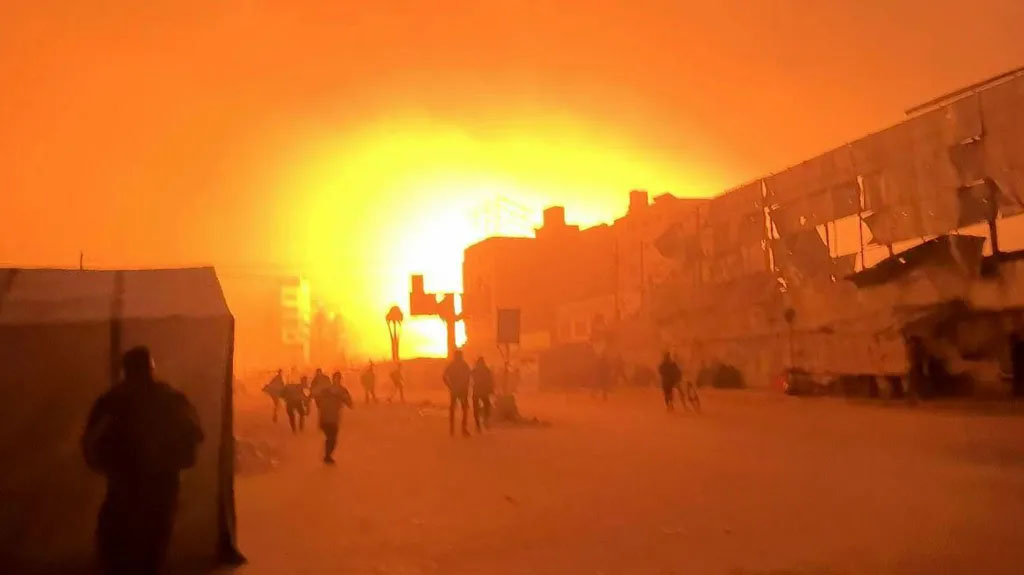
Gaza hospital hit by Israeli strike, Hamas-run health ministry says
An Israeli air strike has destroyed part of a hospital in Gaza City, the territory’s Hamas-run health ministry has said.
Witnesses said the strike destroyed the intensive care and surgery departments of Al-Ahli Baptist Hospital, the main medical facility in Gaza City.
Video posted online appeared to show huge flames and smoke rising from the hospital after missiles hit a two-storey building. People, including some patients still in hospital beds, were filmed rushing away from the site.
Israel said it was looking into reports of the strike. No casualties were reported, according to the civil emergency service.
The health ministry said the building was “completely destroyed”, leading to the “forced displacement of patients and hospital staff”.
A local journalist, who was working at the hospital, said the Israel Defense Forces (IDF) had phoned a doctor who was operating in the emergency department and asked them to evacuate the hospital immediately.
“All patients and displaced people must go out to a safe distance,” the officer reportedly said.
READ ALSO:
- Massilia Motors launches new Mitsubishi L200 with low fuel consumption, advanced engineering
- London mother sentenced to life in prison for drowning two sons
- LASRRA, LASDA to launch strategic documentation drive for Lagos diaspora database
“You have only 20 minutes to leave.”
Footage on social media showed staff and patients leaving the building while it was still dark outside.
Dozens of Palestinians, including women and children, were also seen fleeing from a courtyard inside the hospital where they had been seeking shelter.
Al-Ahli – a small medical facility before the war – is now the only hospital still functioning in Gaza City following the destruction of Al-Shifa medical complex and hospitals in the northern part of the Strip.
In its statement, the Hamas-run government media office condemned the attack.
Israel “is committing a horrific crime by targeting Al-Ahli Hospital, which houses hundreds of patients and medical staff”, it said.
In October 2023, an attack on the same hospital killed hundreds of people.
Palestinian officials blamed an Israeli strike for the blast. Israel said the blast was caused by a failed rocket launch by the Palestinian Islamic Jihad militant group, which denied responsibility.
The Israeli military launched a campaign to destroy Hamas in response to an unprecedented cross-border attack on 7 October 2023, in which about 1,200 Israelis were killed and 251 others were taken hostage.
More than 50,933 people have been killed in Gaza since then, according to the territory’s Hamas-run health ministry.
Of those, 1,563 have been killed since 18 March, when Israel restarted its offensive in the Gaza Strip, the ministry said.
Gaza hospital hit by Israeli strike, Hamas-run health ministry says
BBC
-

 metro2 days ago
metro2 days agoKidnapping: Our lives are hanging by a thread, residents of Igbogbo-Baiyeku communities in Lagos cry out
-

 International2 days ago
International2 days agoUS announces new visa requirements for Nigerian applicants
-

 International1 day ago
International1 day agoUS embassy announces new visa interview requirements for Nigerian applicants
-

 Sports1 day ago
Sports1 day agoBreaking: Former Super Eagles coach Christian Chukwu passes away at 74
-

 Sports3 days ago
Sports3 days agoCristiano Ronaldo ventures into movie industry, unveils new studio
-

 Politics2 days ago
Politics2 days agoAtiku leads Tambuwal, El-Rufai, others to Buhari as 2027 election draws near
-

 metro2 days ago
metro2 days agoIbadan Pastor ends 30-year-marriage over sex dispute with wife
-

 metro2 days ago
metro2 days agoKemi Olunloyo angry, disowns family after father’s death

